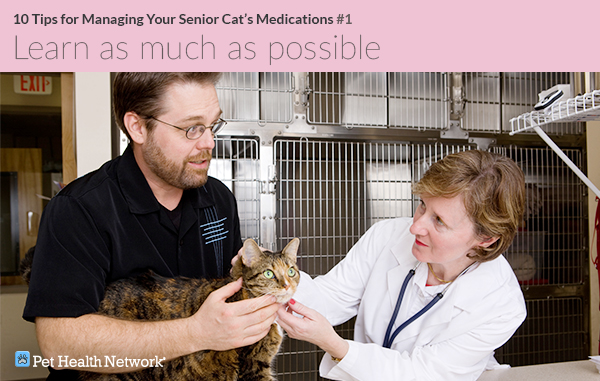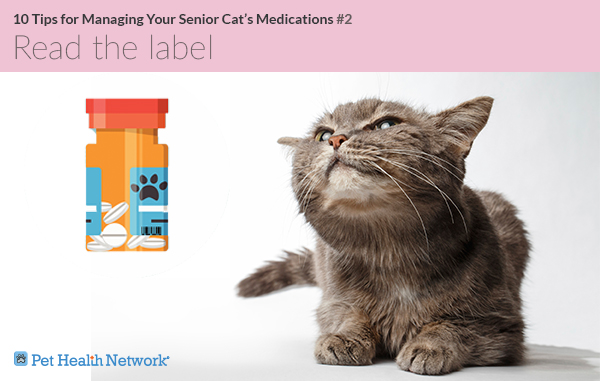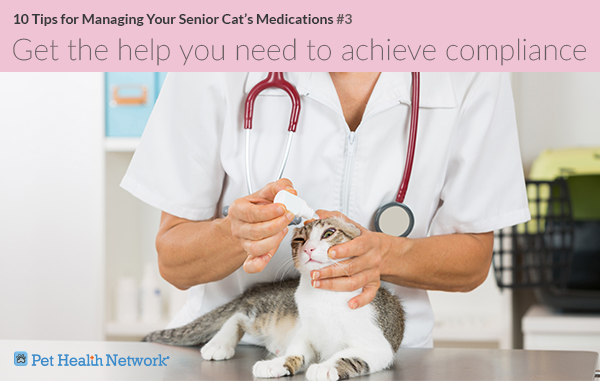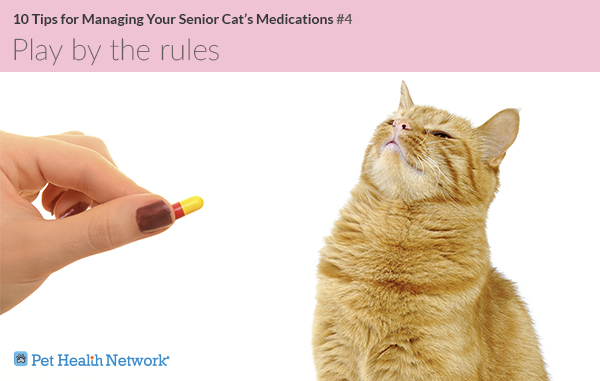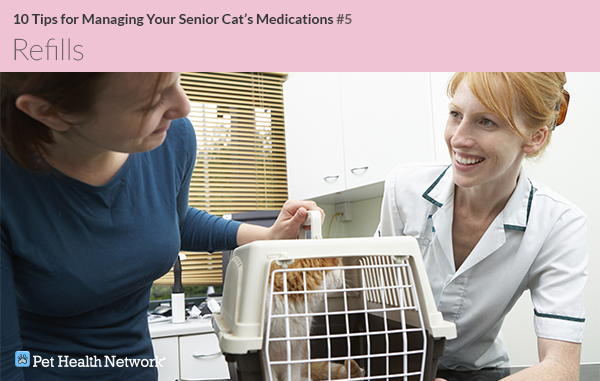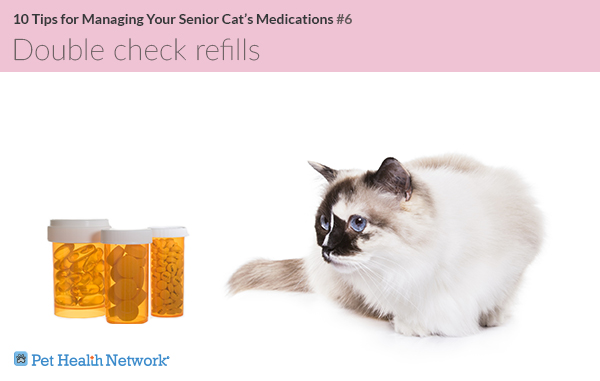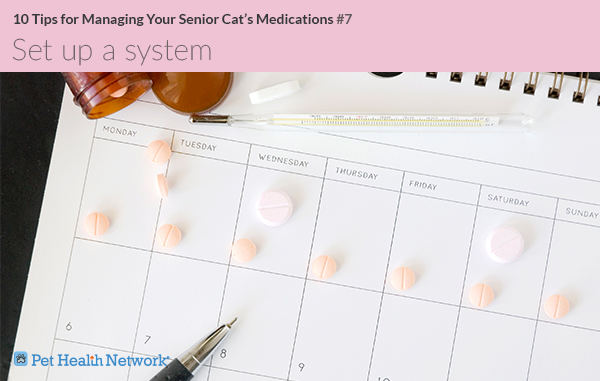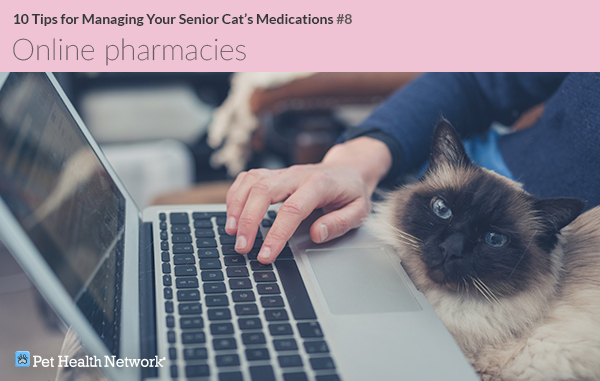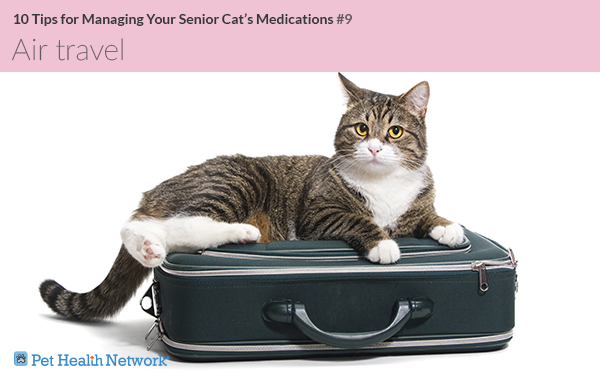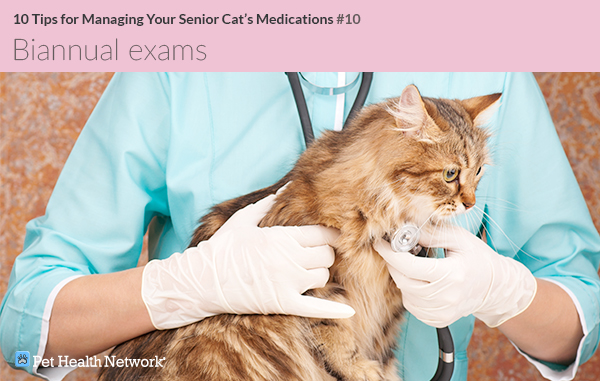Has your tabby transitioned into his teens? Has your Siamese achieved senior citizen status? If so, it’s likely that some medical issues have accompanied your cat’s aging process. Examples include:
- Osteoarthritis
- Heart disease
- Diabetes
- Allergies
- Digestive issues
- Hyperthyroidism (an underproduction of thyroid hormone)
- Kidney failure
Fortunately, many of these maladies can be successfully managed with long term, if not lifelong, medication. Here are ten tips to ensure that, as a conscientious caregiver, you are doing the best job possible with your cat’s medications:
When a new medication is prescribed for your senior kitty, talk with your veterinarian to gather answers to the following questions:
- What is the medication supposed to do?
- What signs of improvement should I be looking for?
- Is this medication compatible with other drugs and supplements my cat is receiving, and can they all be given at the same time?
- What are the potential side effects and what should I do if I observe them?
- Does the timing of administration need to be exact?
- Do I need to take special precautions when handling the medication?
- What happens if a dosage is accidentally skipped?
- Should I give the medication if my cat is having an “off day”— lethargic or not eating well?
- How long should the medication be administered? (Just because the pill vial is empty, doesn’t necessarily mean that your veterinarian wants it discontinued.)
The prescription label often contains useful information intended to ensure that the medication works well. Read the label carefully to find instructions such as:
- Keep refrigerated
- Shake well before using
- Administer on an empty stomach
- Discard after a particular date
Many cats are real stinkers when it comes to sitting still for eye drops or swallowing a bitter tasting pill. Rely on your veterinary staff members to provide you with their tricks of the trade. Often, a simple suggestion can dramatically reduce the amount of “medication stress” for you and your cat.
It is in your cat’s best interest to give medications exactly as prescribed. If doing so isn’t feasible, because of your schedule or it simply doesn’t feel like the right thing to do, rather than skipping dosages or discontinuing treatment, have a frank discussion with your veterinarian. Almost always there will be other options to consider.
Keep in mind that, in addition to authorizing refills for your cat’s medications, your veterinarian is juggling a whole host of other job responsibilities. For this reason, don’t wait until you are down to the last pill to request a refill. Provide at least two to three days notice.
Accurately filling a prescription requires several steps:
- Selecting the correct medication off the shelf
- Selecting the correct dosage
- Dispensing the correct amount
- Typing accurate information on the label
With so many steps, it’s easy to understand how prescribing errors occur. Whenever you pick up a refill of your cat’s medication, double check that everything is accurate. Any change in what you are used to, such as the size or color of the tablet, warrants a call to your veterinarian.
If you are giving multiple medications to your senior kitty, it makes good sense to create a system that prevents missed doses or double dosing. Such goofs are easy to make, particularly when more than one person in the household is responsible for administering medications. Use of a chart that can be checked off when medications are given or a pill organizer (the plastic box with individual compartments) can cut down on dosing errors.
Purchasing prescription drugs online comes with its plusses (cost and convenience) and minuses (potential for incorrect formulation, improper storage, dosage inconsistencies). If you are interested in purchasing your cat’s medications online, talk about this with your veterinarian and ask for a recommendation for a reputable company.
If you and your cat travel by plane, be sure to keep his medications with your personal belongings in the cabin rather than in the baggage compartment. Otherwise, a lost suitcase can translate into a huge hassle trying to refill medications on the 'fly.'
Any cat who has achieved the rank of “senior citizen” is well served by a veterinary exam at least twice a year. This is particularly true for cats receiving medications. The office visit provides an opportunity to discuss how the medications are working and how well they are being tolerated. Blood testing can gauge the effectiveness of some medications as well as screen for harmful side effects. Lastly, a significant change in your cat’s body weight may warrant a dosage change in his medication.
If you have any questions or concerns, you should always visit or call your veterinarian -- they are your best resource to ensure the health and well-being of your pets.

Cat Kidney Disease Articles
Chronic Kidney Disease: What Does Kidney Failure in Cats Really Mean?Kidney Disease in Cats 101
5 Things Vets Hate About Kidney Disease in Cats … And How That’s About to Change

